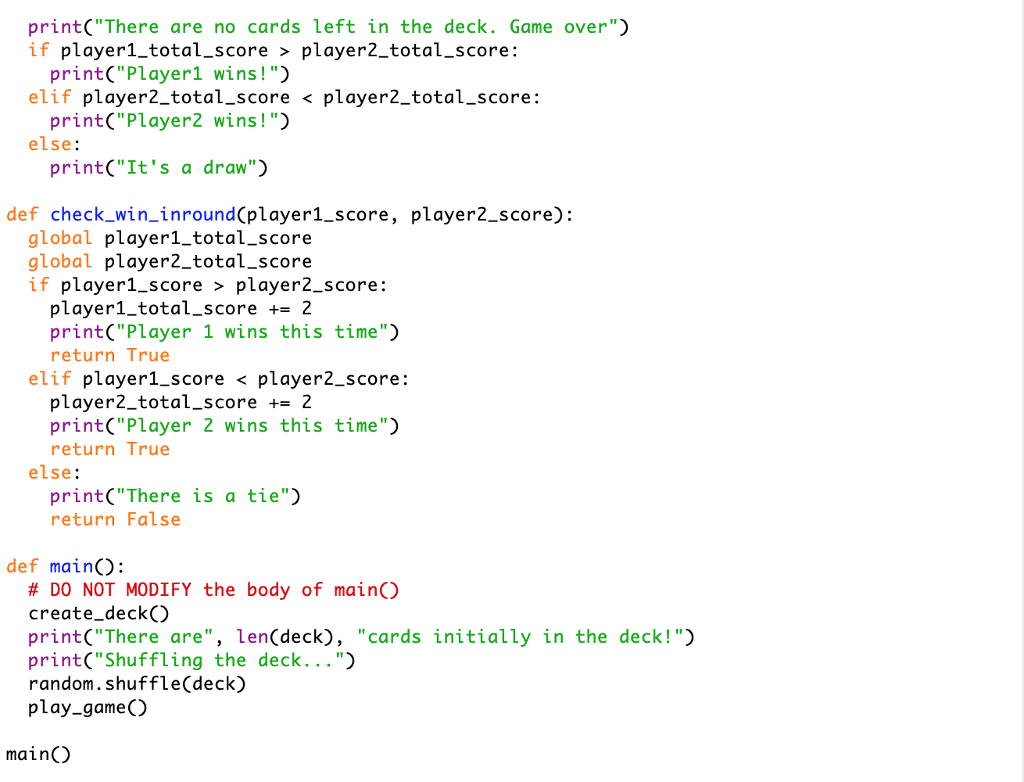- War Python Code
- I Declare War Card Game Online
- War Card Game In Python
- War Card Game Python Source Code
- Python Is This Your Card

Contents of “cards.py” (the Card and Deck classes). Game Rules (Simple Version) War is a two-player game which uses a standard deck of 52 cards. Suits are ignored in the game, and the cards are ordered as follows: Ace King Queen Jack 10 9 8 7 6 5 4 3 2 (Aces are the highest cards). War-Card-Game.This repo will contain the code for war card game in python.War:- War (also known as Battle in the United Kingdom) is a card game typically played by two players. It uses a standard playing card deck.The objective of the game is to win all of the cards.- The deck is divided evenly among the players, giving each a down stack.
Use python 3: War card game .(note Please use theSKELETON CODE provided).Drag the picture to webpage box toexpand.
Skeleton code for program :

# War Game
import random
class CircularQueue:
# Constructor, which creates a new empty queue:
def __init__(self, capacity):
if type(capacity) != int or capacity<=0:
raise Exception (‘Capacity Error’)
self.items = []
self.capacity = capacity
self.count=0
self.head=0
self.tail=0
# Adds a new item to the back of the queue, and returnsnothing:
def enqueue(self, item):
if self.count self.capacity:
raise Exception(‘Error: Queue is full’)
if len(self.items) < self.capacity:
self.items.append(item)
else:
self.items[self.tail]=item
self.count +=1
self.tail=(self.tail +1) % self.capacity
# Removes and returns the front-most item in the queue.
# Returns nothing if the queue is empty.
def dequeue(self):
if self.count 0:
raise Exception(‘Error: Queue is empty’)
item= self.items[self.head]
self.items[self.head]=None
self.count -=1
self.head=(self.head+1) % self.capacity
return item
# Returns the front-most item in the queue, and DOES NOT change thequeue.
def peek(self):
if self.count 0:
raise Exception(‘Error: Queue is empty’)
return self.items[self.head]
# Returns True if the queue is empty, and False otherwise:
def isEmpty(self):
return self.count 0
# Returns True if the queue is full, and False otherwise:
def isFull(self):
return self.count self.capacity
# Returns the number of items in the queue:
def size(self):
return self.count
# Returns the capacity of the queue:
def capacity(self):
return self.capacity
# Removes all items from the queue, and sets the size to 0
# clear() should not change the capacity
def clear(self):
self.items = []
self.count=0
self.head=0
self.tail=0
# Returns a string representation of the queue:
def __str__(self):
str_exp = “]”
i=self.head
for j in range(self.count):
str_exp += str(self.items[i]) + ” “
i=(i+1) % self.capacity
return str_exp + “]”
# # Returns a string representation of the objectCircularQueue
def __repr__(self):
return str(self.items) + ‘ Head=’ + str(self.head) + ‘Tail=’+str(self.tail) + ‘(‘+str(self.count)+’/’+str(self.capacity)+’)’
# START WRITING YOUR PROGRAM HERE
def read_and_validate_cards():
# TASK 1 Reading and Validating cards
# Three Conditions
# File Exists – raises Exception if it does not.
# 1.Exactly 52 2.Not repeated 3.Correct Format Raises Exception ifany of the
# above is not correct.
# TODO
pass
def distribute_cards(cards):
# Task 2 Distributing cards
# Creates Two circular Queues and return them
# – cards is a list of valid cards that has been read from thefile
# TODO
pass
def get_user_input():
# Task 3 Asking user for input
# prompt the user to enter the number of cards that would befacedown for war
# will repeatedly ask the user to enter a valid value if any numberother than 1 or 2 or 3
# is entered
# returns the number entered by the user
# TODO
pass
def compare_cards(card1,card2):
# Task 4 Comparing Cards
# compares card1 of player 1 with card2 of player2
# if card1 has higher rank return 1
# if card2 has higher rank return 2
# if card1 is equal to card2 reurn 0
# – card 1 is a string representing a card of player1
# – card 2 is a string representing a card of player2
# TODO
pass
class onTable:
# Task 5 Create a class to represent the table
# an instance of this class represents the table
def __init__(self):
# self is the onTable object
# TODO
pass
def place(self,player,card,hidden):
# places the given card on the table
# -self is the onTable object
# -player is an object of type int. It is 1 for player1 or 2 forplayer 2
# -card is an object of type str. It is the card being placed onthe table
# -hidden is an object of type bool. False when the card is faceupand True when facedown
# TODO
pass
def cleanTable(self):
# cleans the table by initializing the instance attributes
# -self is the onTable object
# TODO
pass
def __str__(self):
# returns the representation of the cards on the table
# -self is the onTable object
# TODO
pass

def main():
# TODO – IMPLEMENT ALGORITHM HERE
pass
War Python Code
main()
———————————————————————————————————————————————————————————————————————————————
I Declare War Card Game Online
# separate program that creates a file representing deckof cards, doesn’t need to be changed.
War Card Game In Python
from random import shuffle
suits=[“D”, “C”, “H”, “S”]
ranks=[“K”,”Q”,”J”,”A”,”2″,”3″,”4″,”5″,”6″,”7″,”8″,”9″,”0″]
cards=[]
for rank in ranks:
for suit in suits:
cards.append(rank+suit)
shuffle(cards)
try:
cardFile= open(“shuffledDeck.txt”, “w”)
for card in cards:
cardFile.write(card+”n”)
except IOError as e:
print (“I/O error({0}: {1}”.format(e.errno, e.strerror))
except:
print (“Unexpected error”)
finally:
cardFile.close()
print (“The following shuffled 52 card deck was saved inshuffledDeck.txt”)
print (cards)
War Card Game Python Source Code
Expert Answer

Python Is This Your Card
: Francis Poulenc Flute Sonata